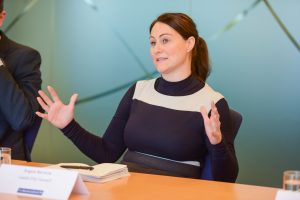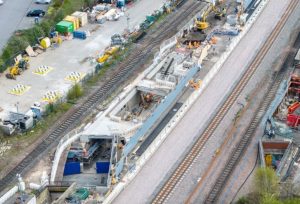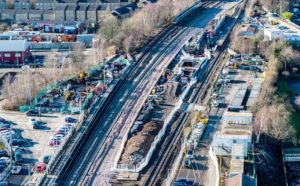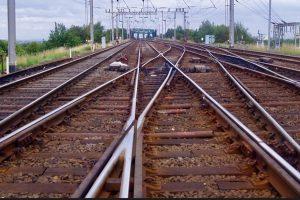Levelling up a ‘lost cause’ without public transport investment

A panel of experts forcefully made the case for delivering Northern Powerhouse Rail (NPR) in full, along with the eastern leg of HS2.
This research has highlighted the huge productivity benefits of building a new high-speed rail link between Leeds, Bradford and Manchester.
The Government has stated its support for delivering the new high-speed rail network that would better connect the North’s city regions.
But it has provided no timetable for NPR delivery and has yet to publish the Integrated Rail Plan (IRP), which was originally due at the end of last year.
Cathy Travers, managing director, UK and Europe, Mott MacDonald, made the point that it is currently easier for her to travel from Leeds to London than it is to travel across the north of England.
“We need to create a thriving economy where people can access world class education, jobs and healthcare and live a really fulfilling life here in the North of England,” she said.
“We know Northern Powerhouse Rail can have a transformational effect and we need to be bold and ambitious about delivering it.”

Henri Murison
Henri Murison, director of the Northern Powerhouse Partnership, said the Government had made a promises to northern people about levelling up, with the economic rationale of NPR being at the centre of the concept of the Northern Powerhouse.
He said levelling up is a “lost cause” without the necessary improvements in transport infrastructure, adding he feared the Government would not follow through with the full plan for NPR and HS2.
Murison said presenting Mott MacDonald’s report was a last throw of the dice to persuade the Government to make the right decision.
“I feel a sense of deep personal frustration that communities in the north of England, which have huge opportunities, might have these taken away from them,” he said.
“If this Government investment isn’t made then private investment will start to ebb away and will go back to London and the South East where it came from.”
Professor Paul Hammond, global leader of the Infrastructure Development and Economics Practice in Mott MacDonald, said the £22bn which Northern Powerhouse Rail could inject into the northern economy by 2060 is equivalent to 50,000 extra jobs.
He noted it had taken him two hours to travel to Leeds from his home in Warrington, though it only takes one hour 45 minutes to get to London from Warrington.
“Queen Victoria was on the throne the last time there was major investment in a new railway line north of Watford,” he added.
“London has had a new railway built – the Elizabeth Line – which will open soon. How can we expect the UK to be an international force if we don’t invest equally in all parts of the UK?
“Better connections across the whole of the north will enable cities to specialise in what they’re good at doing. It’s only through this investment in strong infrastructure that we can have a polycentric north.”
Hammond stressed if travel times between Leeds, Bradford and Manchester could be cut to just 15 minutes, people could travel around the region as easily as people move across London, with massive implications for work, education and leisure.

Angela Barnicle
Also on the panel was Angela Barnicle, who is chief officer, asset management & regeneration, for Leeds City Council.
She said the current Trans Pennine rail route is not fit for purpose, even though Leeds is now the third largest centre for manufacturing in the UK, and Leeds Railway Station has more people going through it than Manchester Airport.
Barnicle said 40,000 people commute between Leeds and Bradford each day, but the journey time between these cities is a minute longer today than it was when the Victorians built this line.
Karen Smart, managing director of Manchester Airport, said the airport has become a truly global hub. She said pre-pandemic it had 70 to 80 airlines serving 210 destinations – 50 of which were long-haul.
“It’s incredibly important that we can make connections easy between towns and cities in the north and connect them to the global economy,” she said.
“If we can get NPR and HS2 we’ll have 50% of the north’s population within a 90-minute journey time of the airport.”








